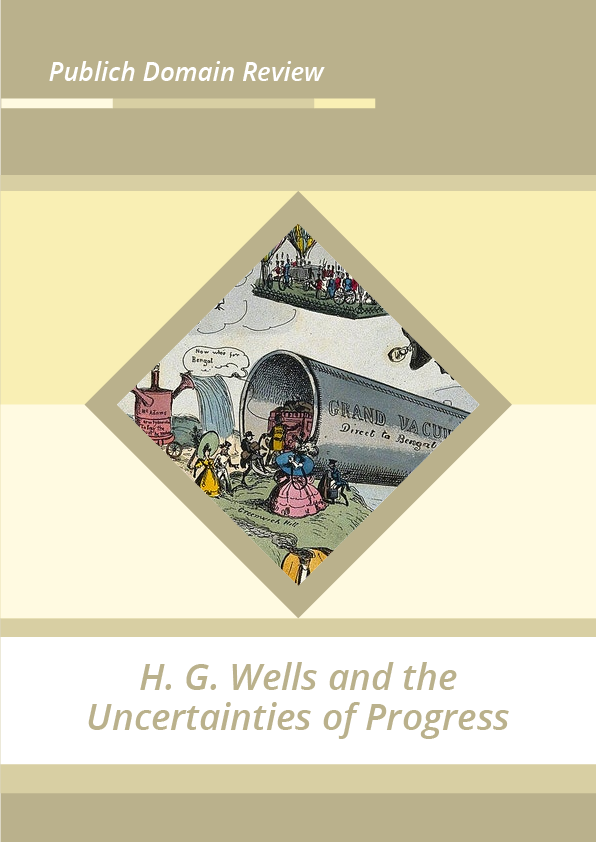In addition to the numerous pioneering works of science fiction by which he made his name, H. G. Wells also published a steady stream of non-fiction meditations, mainly focused on themes salient to his stories: the effects of technology, human folly, and the idea of progress. As Peter J. Bowler explores, for Wells the notion of a better future was riddled with complexities.
H. G. Wells worried constantly about the future of humanity. While he hoped for progress in human affairs, he was only too well aware that it was not inevitable and might not be sustained. Throughout his career he celebrated the technological developments that were revolutionizing life but feared they might lead to eventual degeneration or, as came to pass in 1914, a catastrophic war. He was also aware that there were disagreements over what would actually count as progress. Providing everyone with the benefits of modern industry might not be enough, especially as continued technological innovation would require the constant remodeling of society. Progressive steps introducing entirely new functions were episodic, open-ended and unpredictable, in both biological and social evolution. These uncertainties were compounded by a realization that, where technological innovation was concerned, it was virtually impossible to predict future inventions or what their long-term consequences might be. Even if progress continued, it would be much more open-ended than advocates of the traditional idea of progress had imagined.
For Wells the most basic level of uncertainty arose from the fear that the human race might not sustain its current rate of development. In his 1895 story “The Time Machine” he imagined his time traveler projected through eras of future progress: “I saw great and splendid architecture rising about me, more massive than any buildings of our time, and yet, as it seemed, built of glimmer and mist.” But the time traveler ends up in a world brought down by social division and degeneration. The brutal Morlocks are the descendants of the industrial workers, while the childlike Eloi are the remnants of the leisured upper classes. This prediction was based on his zoologist friend E. Ray Lankester’s extension of the Darwinian theory. Lankester argued that because evolution works by adapting populations to their environment, progress is not inevitable and any species that adapts itself to a less active and hence less challenging way of life will degenerate.3 Here was the model for a more complex vision of progress in which any advance would depend on the circumstances of the time and could not be predicted on the basis of previous trends.
The Darwinian viewpoint is more clearly visible in Wells’ hugely successful non-fiction work The Outline of History, originally published in fortnightly parts in 1920. The survey starts from the development of life on earth and the evolution of the human species. Progress had certainly happened both in evolution and in human history from the Stone Age onward, but Wells shows that there was no predetermined upward trend. His exposure to the Darwinian vision of biological evolution (which continued in his collaboration with Julian Huxley to produce The Science of Life some years later) showed him that there were multiple ways of achieving a more complex biological structure — or a more complex society. Truly progressive steps in both areas were sporadic, unpredictable, and open-ended. When progress did occur in human society, Wells was certain that the driving force was rational thinking, science, and technological innovation. Yet history showed how all too often the benefits of creativity had been undermined by conservatism and social tensions, culminating in the disaster of the Great War.
Wells was elaborating a new and less deterministic version of the idea of progress. Nineteenth-century society’s faith in the inevitability of progress had been misplaced, not just because it underestimated obstacles, but because it had assumed an oversimplified model of how development must take place. Whatever their differing views of the goal to be achieved, the thinkers of the previous generation — including the Marxists, who Wells admired to some extent — had all visualized history as the ascent of a ladder of developmental stages leading to a final utopia. Darwinism showed that the history of life was best represented by a branching tree, not a ladder, and Wells now saw that human history too led to many differing forms of complex society. And, just as the great “breakthroughs” in animal evolution had often come from insignificant beginnings, the most important advances in human history were not best characterized as continuations of previous trends. Wells takes the modern synthesis of science and technology, which he sees as emerging primarily in Europe, as a case in point. For most of its history, Europe had not been at the forefront of progress, yet its development of modern science and industry had catapulted it into world dominance. Wells openly compared this to the evolution of the originally insignificant mammals during the age of the dinosaurs.
This modern breakthrough had been achieved in only one branch of the divergent tree of cultural evolution, a branch that had not been in the mainstream and was by no means the most advanced at the time. Wells was not the only thinker at this time to argue that the emergence of science in Europe could not have been predicted on the basis of previous historical trends. Alfred North Whitehead made the same point, suggesting that without this unlikely breakthrough, humanity might have remained stagnant for untold ages to come. Whitehead saw the rise of modern science as a philosophical development that did not become associated with technological invention until the nineteenth century. Wells argued that the underlying cause of Europe’s rise to world dominance was its isolated geographical position, which had encouraged the age of maritime exploration. Unlike the great empires of the past, Europe faced the unusual challenge of a geography dictated not by the land but by the sea — it faced outward to the Atlantic and beyond. The result was a culture that eventually promoted not just an industrial revolution but what Wells called a “mechanical revolution” — especially the invention of new sources of power including steam and electricity. For Wells it heralded “a new thing in human experience … such a change in human life as to constitute a fresh phase of history.”











